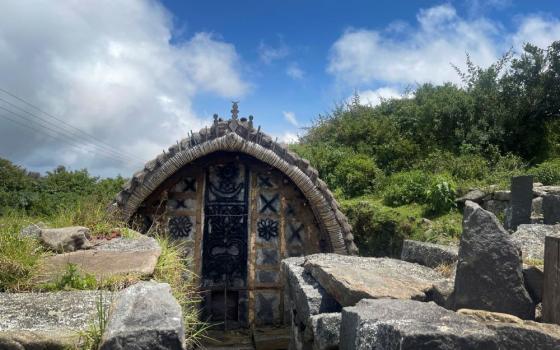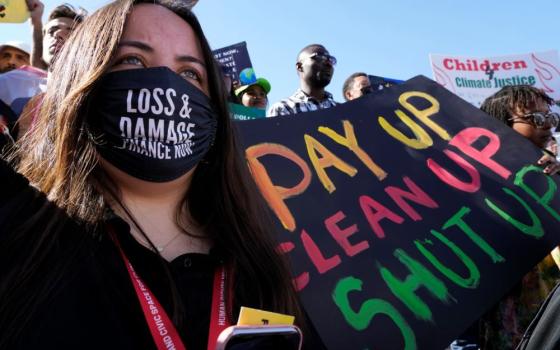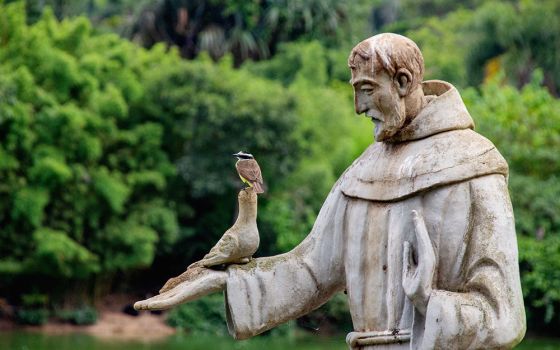Pope Francis signs the Interfaith Statement on Climate Change in his Vatican residence Dec. 3. He had been scheduled to sign the document at the Faith Pavilion at COP28 in Dubai, United Arab Emirates, but was forced to cancel the trip because of a bronchial infection. He would have been the first pope to attend a U.N. climate conference. (CNS/Vatican Media)
Welcome to Burning Questions, the EarthBeat feature that takes on those questions smoldering in your mind about climate change and religion — from the basics to more complex, and everything in between.
On Dec. 2 in Dubai, Cardinal Pietro Parolin addressed an audience of presidents and prime ministers at COP28, delivering a call from the pope for a "breakthrough" in international negotiations on climate change that would "lead to a decisive acceleration of ecological transition," including the elimination of fossil fuels.
The speaking slot originally was set for Pope Francis, who until a recent illness derailed his travel plans, was expected to become the first head of the Roman Catholic Church to attend a United Nations climate conference.
The planned trip was widely seen as an effort by Francis to bring strong, unbracing messages from his recent apostolic exhortation on the climate crisis directly to the negotiators and world leaders he's critiqued for moving far too slowly in the face of rapidly rising temperatures and calamitous impacts of climate change.
But why would a pope plan to attend an international climate conference in the first place?
That's the topic of the latest Burning Question here at EarthBeat.
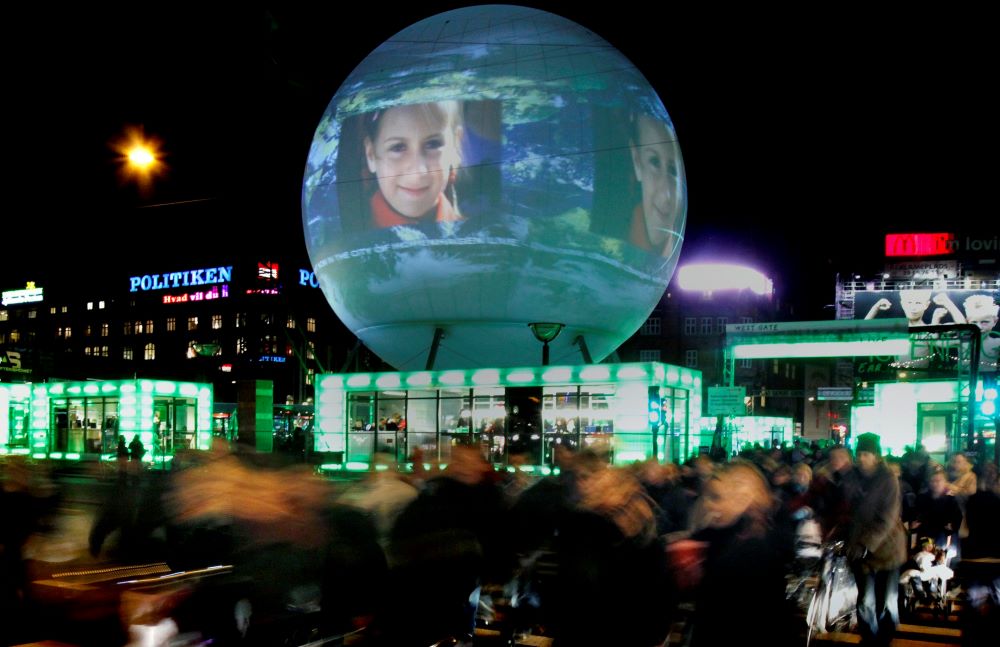
A large globe featuring an interactive display sits outside the U.N. climate change conference in Copenhagen, Denmark, Dec. 8, 2009. (CNS/Reuters/Bob Strong)
Let's take a step back. What's COP28?
When it comes to the U.N., there's a lot of jargon. That includes the annual climate conferences.
COP stands for Conference of the Parties, with parties referring to the 197 parties that have joined the U.N. Framework Convention on Climate Change — a treaty reached in 1992 under which nations committed to take action in response to climate change.
So COP28 is the 28th iteration of the conference. The location changes each year, and for 2023, the host nation is the United Arab Emirates, with the conference taking place in Dubai.
The first COP was held in 1995 in Berlin.
There have been several notable COPs since then, but perhaps most significant to date was COP21 in Paris, where the Paris Agreement was adopted. That accord was heralded as a major milestone in international climate negotiations, as it was the first time that all nations agreed to take steps to reduce planet-heating greenhouse gases, which are primarily released from the burning of fossil fuels like coal, oil and gas.
A major focus in Dubai is the "global stocktake" process, which will show nations have made some progress but are well off track from meeting the goals set in the Paris Agreement, namely reducing emissions in order to limit average global temperature rise ideally to 1.5 degrees Celsius and at minimum "well below" 2 C.
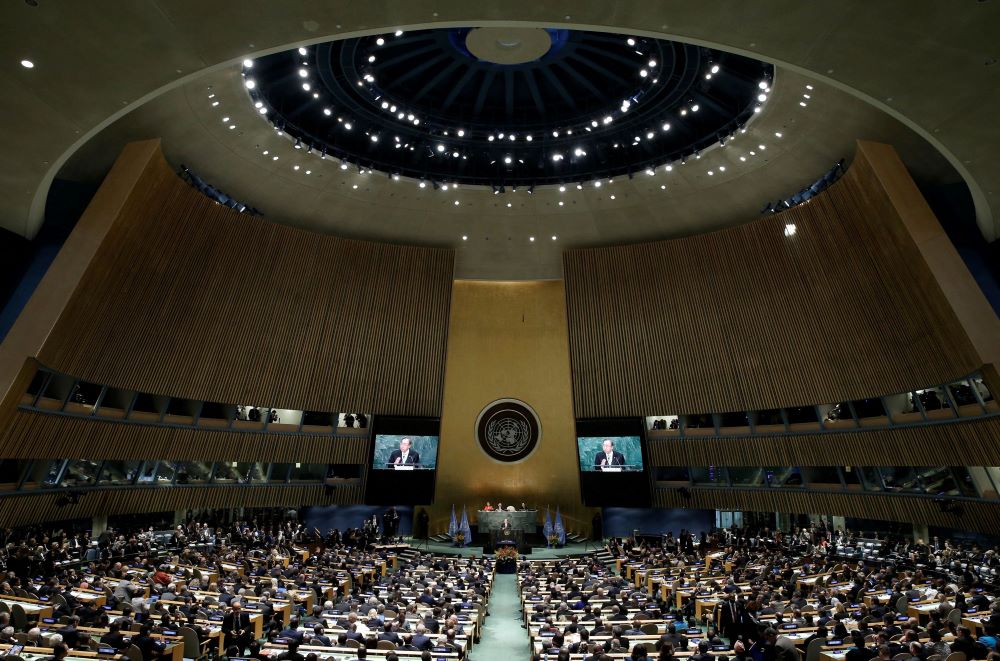
The signing ceremony for the Paris Agreement on climate change is seen at U.N. headquarters in New York City April 22, 2016. The Holy See signed onto the Paris Agreement on Oct. 4, 2022. (CNS/Reuters/Mike Segar)
At 2022's COP27, in Sharm el-Sheikh, Egypt, nations established a loss and damage fund to direct financing to countries and communities that already have experienced destruction from impacts related to climate change.
On the first day of COP28, nations finalized the loss and damage fund, and industrialized nations provided initial financing of $425 million. More deals have been announced, but the major sticking point — will countries commit to a phaseout of fossil fuels? — remains unresolved.
If this is a space for nations to figure out how to address climate change, what is the Catholic Church doing there?
Countries are certainly the primary focus at the climate COPs, but they're far from the only participants.
In Dubai, more than 100,000 delegates registered for the conference — by far, the largest ever at a climate COP. In addition to negotiating parties and government officials for each country — including the Vatican City State, the smallest nation in the world — attendees include scores of activists, NGOs, Indigenous leaders, business representatives, media and lobbyists, including from the fossil fuel industry. Collectively, they're referred to as civil society.
Religious leaders and officials are part of civil society, as well.
Since the 1992 Earth Summit in Rio de Janeiro, where the UNFCCC was formed, people of faith have been regular participants in the climate COPs. That includes members of the Catholic Church, including many from religious orders and Catholic humanitarian and development agencies under Caritas Internationalis, as well as from the Vatican.
A Vatican delegation was present in Rio, with a focus on raising concerns about linking ecological issues with population control.
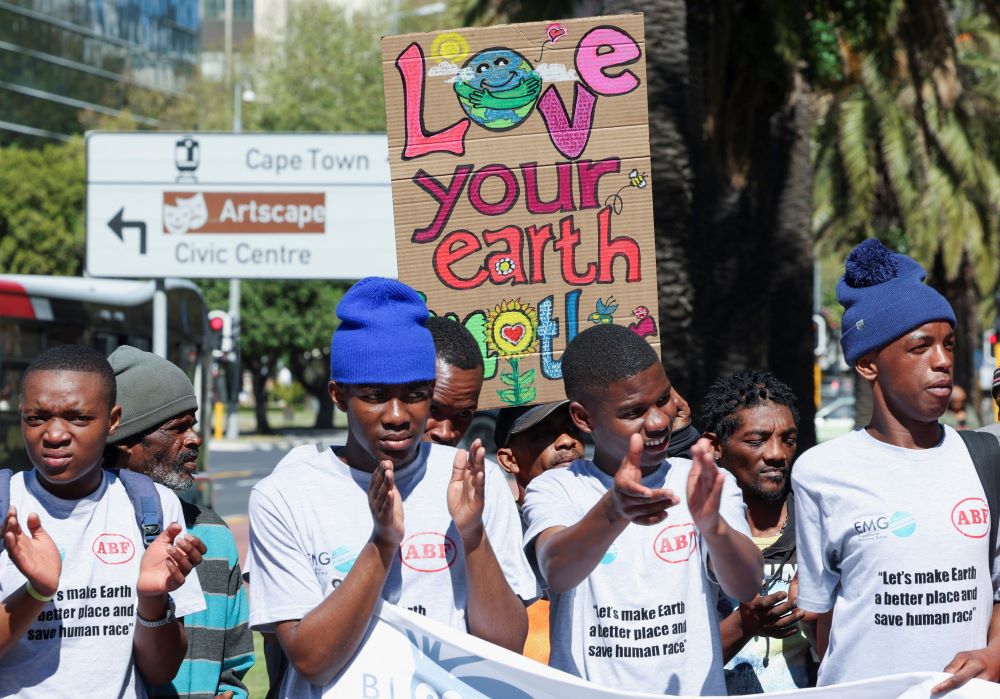
A climate activist holds a placard as demonstrators in South Africa gather outside the Cape Town International Convention Center Sept. 13 during the Southern Africa Oil and Gas Conference to call for climate justice resistance against oil and gas corporations and an end to fossil fuels. (OSV News/Reuters/Esa Alexander)
In the years since, Catholic representatives have consistently advocated on behalf of people who have contributed the least to global warming but are most impacted by dangerous heat waves, droughts, wildfires, flooding and storms. Along with other religious actors, they have framed a global response to climate change as a matter of morality and justice, with countries historically responsible for the majority of emissions bearing greater responsibility to address the crisis and assist developing countries and vulnerable communities in their own mitigation efforts and build resilience to climate impacts.
The majority of nongovernment participants engage the climate COP through what's known as observer status, watching and attending sessions in order to raise public awareness of what's happening and with it, exert pressure on countries when necessary.
The observer ranks included the Vatican, until last year.
On Oct. 4, 2022, the Holy See formally entered into the UNFCCC and signed onto the Paris Agreement, a move possible because the Vatican City State is a sovereign nation. By doing so, the Holy See moved beyond observer status to having a seat at the negotiating tables where details on how to implement the Paris Agreement are hashed out. Joining the UNFCCC and Paris accord also means that the Vatican, too, is obligated to meet its goals.
In May, the Holy See submitted its first climate pledge, or nationally determined contribution, where it committed to slash emissions within the Vatican City State by 20% below 2011 levels by 2030 and to reach net-zero emissions by 2050.
So Vatican officials have taken part in climate COPs in the past. Has a pope ever attended a COP climate conference?
Both Pope Benedict XVI and Pope Francis have been active in engaging the U.N. climate conferences.
In 2009, Benedict sent a video message to participants at COP15 in Copenhagen. That event was billed as a major gathering but widely viewed as a failure for not producing a legally binding treaty among all countries to reduce emissions.
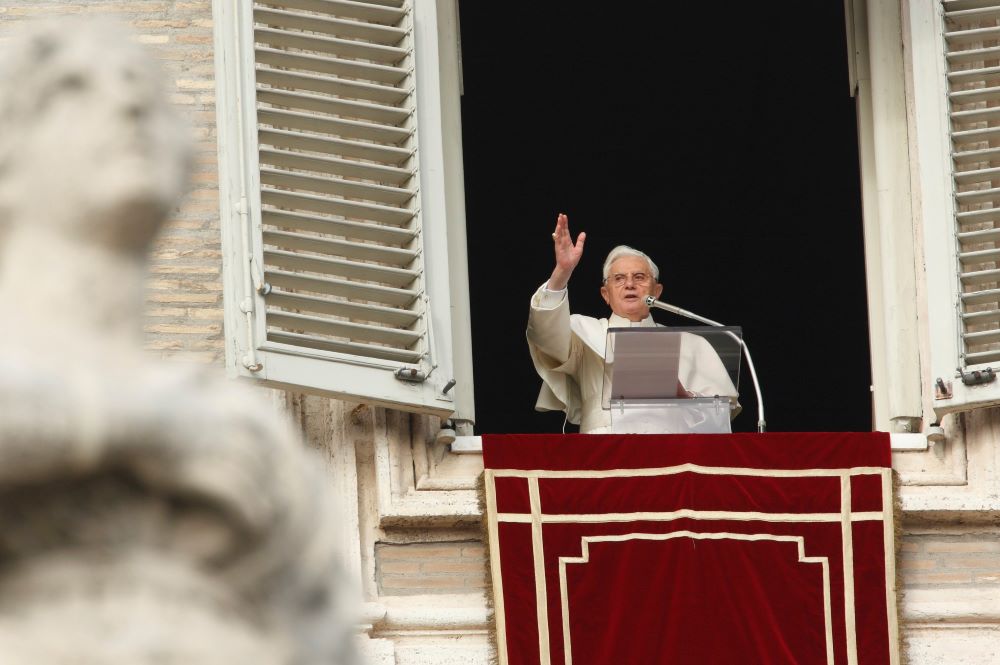
Pope Benedict XVI blesses people gathered for the Angelus in St. Peter's Square at the Vatican Dec. 6, 2009. On the eve of the U.N. climate summit in Copenhagen, the pope said protection of the environment requires sober lifestyles and rediscovery of the "moral dimension" of development. (CNS/Paul Haring)
"The Earth is indeed a precious gift of the Creator who, in designing its intrinsic order, has given us guidelines that assist us as stewards of his creation," Benedict XVI, dubbed "the green pope," said:ahead of that summit. "Precisely from within this framework, the Church considers that matters concerning the environment and its protection are intimately linked with integral human development,"
He added it was important the governments and the international community "send the right signals to their citizens and succeed in countering harmful ways of treating the environment," and called on participants "to enter into their discussions constructively and with generous courage."
Benedict sent similar messages to subsequent COPs, including COP17 in Durban, South Africa, in 2011. Francis continued this practice, delivering messages to each climate COP since he became pope in 2013. And he has made ecological issues a cornerstone of his decade-long papacy.
"The time for seeking global solutions is running out," Francis wrote to participants at COP20 in Lima, Peru, in 2014. "We can find suitable solutions only if we act together and in agreement. There exists, however, a clear, definitive and unpostponable ethical imperative to act."
While not in attendance, Francis sent a pair of his shoes to Paris in December 2015 as part of a public demonstration ahead of COP21. He also made clear that he timed the release of his encyclical "Laudato Si', on Care for Our Common Home" that year "so that it can make a contribution" in Paris.
At nearly every climate COP, a Vatican delegation, often led by a cardinal, has participated to share the pope's message and priorities in person with national delegations and other groups. And between COPs, ambassadors of the Holy See to the U.N. have worked with countries to act on climate for the benefit of the most vulnerable and the Earth itself.
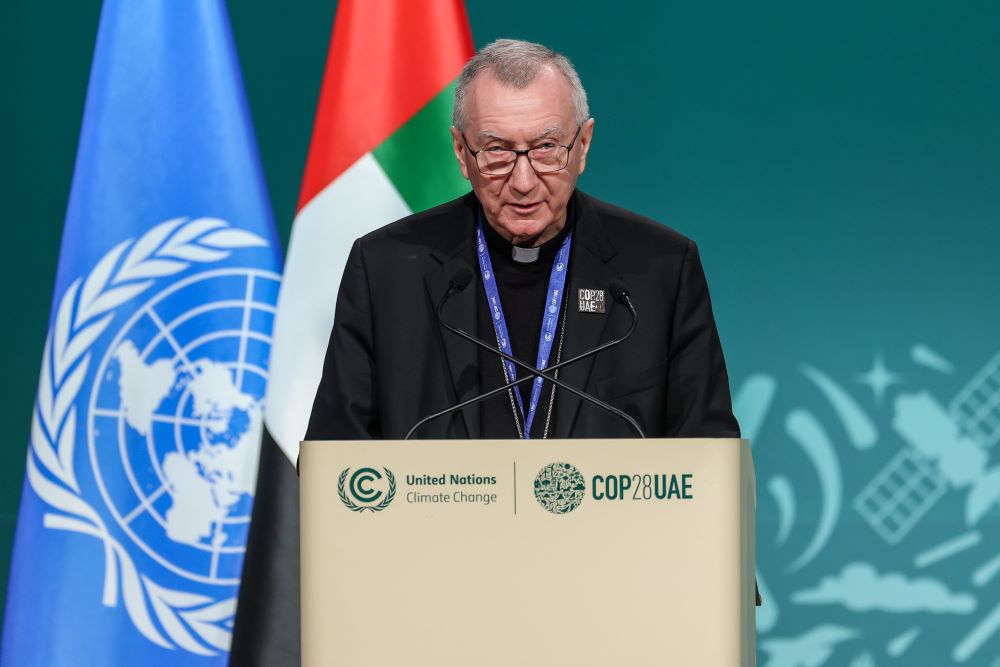
Cardinal Pietro Parolin, Vatican secretary of state, reads Pope Francis' speech at the high-level segment for heads of state and government at COP28, the U.N. Climate Change Conference Dec. 2 in Dubai, United Arab Emirates. (CNS/Courtesy of U.N. Climate Change COP28/Christopher Pike)
In 2021, reports suggested that Francis was contemplating a trip to Glasgow, Scotland, to take part in COP26. Ultimately, he did not go, and Parolin read a message from Francis during the world leaders' summit.
Among those championing Francis' attendance at a climate COP has been John Kerry, the former U.S. secretary of state who now serves as special envoy on climate for President Joe Biden. Kerry, who is Catholic, has said the pope's presence at a climate conference "will have a profound impact."
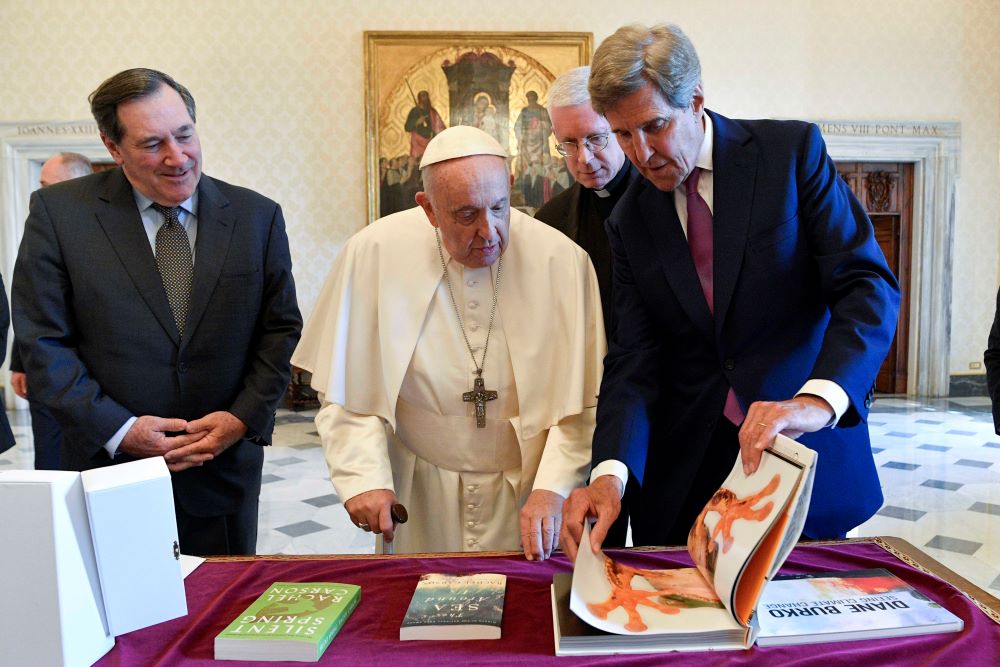
Pope Francis looks at a gift offered by John Kerry, President Joe Biden's special envoy for climate issues, right, during a meeting that also included Joe Donnelly, U.S. ambassador to the Holy See, left, at the Vatican June 19. Kerry, who is Catholic, had been among those championing Francis' attendance at a climate COP. (CNS/Vatican Media)
Observers saw Francis' surprise decision to head to Dubai this year, a year after the Holy See joined the Paris Agreement, as further solidifying the Vatican's intentions of playing a larger role in the negotiations.
As a head of state, Francis was set to speak Dec. 2 during COP28's high-level session with fellow world leaders that takes place during the conference's opening days.
Why did Pope Francis end up not attending COP28 in Dubai?
Lung inflammation later diagnosed as an acute case of bronchitis led the pope's doctors to recommend against traveling to Dubai, where they said the change in climate could worsen his condition. After some initial reluctance, Francis ultimately listened to his doctors and remained at the Vatican. Parolin headed to COP28 to deliver the pope's prepared speech on his behalf.
So despite his physical absence, the pope's words were still heard in the main plenary hall in Dubai's Expo City where the U.N. climate conference is taking place. They were rooted in a major papal teaching document that Francis issued two months before the start of COP28, with an eye again toward influencing the climate negotiations like he did before the Paris proceedings.
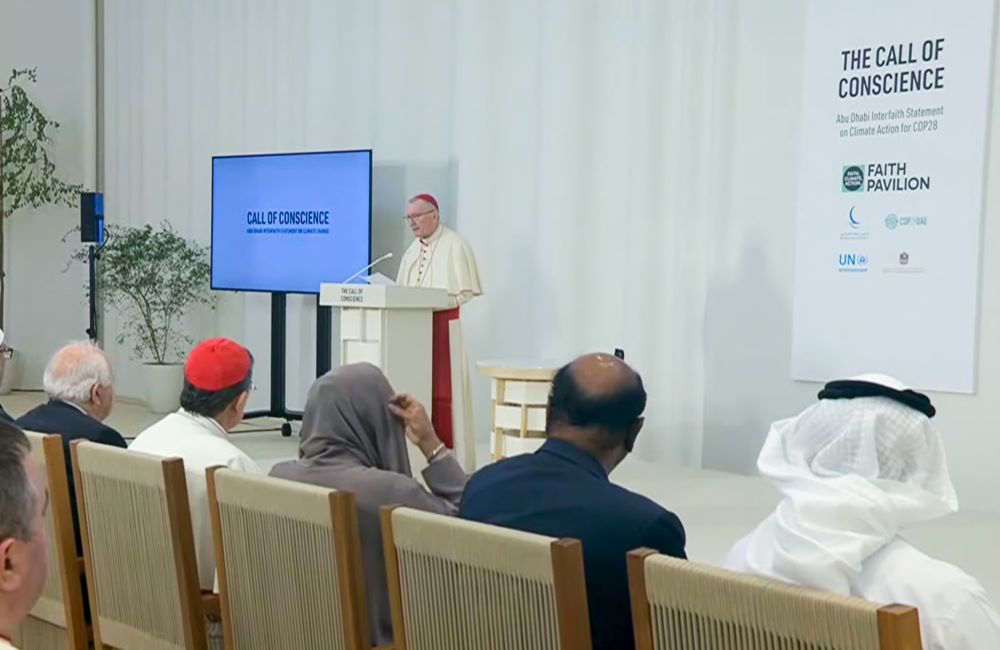
On Oct. 4, Francis issued Laudate Deum, which he addressed "to all people of good will on the climate crisis."
In Laudate Deum, Francis spoke bluntly about what he sees as the shortcomings of the current multilateralism system in producing a global response to climate change equal to what science says is required. He also highlighted the progress and failures so far from the U.N. climate conferences.
In a section focused on expectations for COP28, Francis stated "Despite the many negotiations and agreements, global emissions continue to increase," yet said it would be "suicidal" to give up hope for strong outcomes from COP28.
"We must move beyond the mentality of appearing to be concerned but not having the courage needed to produce substantial changes," he wrote.
Advertisement
In Francis' address that Parolin read at the summit, he repeated themes he expressed in Laudate Deum. "It is essential that there be a breakthrough that is not a partial change of course, but rather a new way of making progress together," the cardinal told the audience on behalf of the pope. He added:
"May this COP prove to be a turning point, demonstrating a clear and tangible political will that can lead to a decisive acceleration of ecological transition through means that meet three requirements: they must be 'efficient, obligatory and readily monitored,' " Parolic read. "And achieved in four sectors: energy efficiency; renewable sources; the elimination of fossil fuels; and education in lifestyles that are less dependent on the latter."
It is unknown what kind of impact Francis delivering that message himself, in person, may have had on negotiations in Dubai. In his stead, Catholic actors, as well as the Vatican delegation, have spent their days at COP28 raising the powerful message of Laudate Deum in meetings and interactions with national delegations and in panel presentations.
And while Francis positioned Laudate Deum to help achieve that much-sought breakthrough at COP28, he also sought a larger shift in multilateralism and a new form of politics that looks beyond short-term benefits at the expense of long-term global challenges.
"In the end, the purpose of power is to serve," he said in his speech. "It is useless to cling to an authority that will one day be remembered for its inability to take action when it was urgent and necessary to do so. History will be grateful to you."




